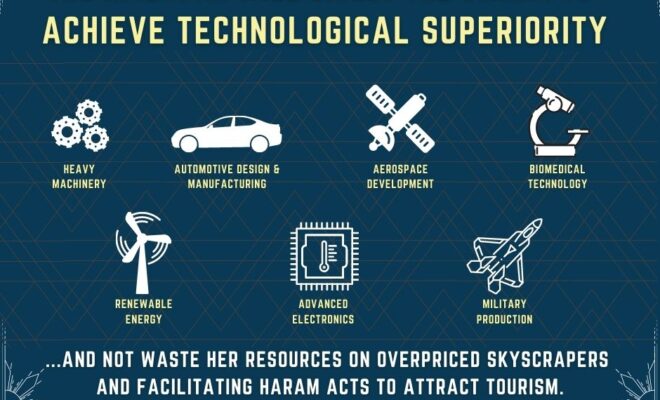Waiting for the Mahdi?

Since the abolishment of the Uthmani Khilafah in 1924, the Ummah has engaged in a struggle against its rulers and their colonial masters to restore the rule of Islam. However, many have accepted the idea that the Muslim Ummah is doomed to its current reality until the arrival of the Mahdi, who is believed to be a man that Allah (swt) will bring about to establish the Islamic rule via the Khilafah and rule justly. Some scholars have even said that the Khilafah will not return until the Mahdi arises, and therefore Muslims are not obligated to re-establish the system of Allah (swt) and should instead only perfect their personal ‘Ibadaat (individual acts of worship) and personal Mu’amalaat (transactions) that are accessible in the reality they live in.
So, is it true that the Mahdi is responsible for re-establishing the Khilafah? Is it upon the Muslims to do nothing and just wait?
Secular Thinking and Fatalistic Religiousness
The Ummah has been living under secularism (separation of religion from state) for the past 95 years since the fall of the Khilafah. The long passage of time without liberation from the grip of the dictatorial rulers, along with routine massacres endured at the hands of the vicious colonial military aggression, has made it difficult for many in the Ummah to see a way out from the current dark reality.
Therefore, relying on the Mahdi to come solve all these problems has been promoted by those who either lack proper understanding of the Ahadith that foretell future events (Seeghat Al-Ikhbaar) and their relation to Hukum Shar’iee (Seeghat Al-Amr), or have been affected by the concept of fatalism – which is to believe that the Ummah is hopeless and powerless, and can only wait for the Mahdi to save the day.
Dealing with Ahadith Foretelling Future Events
There are several Ahadith that are narrated from the Prophet (saw) that foretell future events. Some have come to pass, and others are yet to come to pass. For example, one of the prophecies that has already come to pass is the Hadith narrated by Imam Ahmed where the Prophet (saw) said:
“You will indeed conquer Constantinople (Istanbul),”
and he praised those who conquered it – this being Muhammed Al-Fateh, one of the rulers of the Uthmani Khilafah, and his army. Alternatively, an example of one of the prophecies that has yet to come to pass is the Ahadith regarding the appearance of the Mahdi.
The Mahdi in the Texts
The word Mahdi linguistically comes from the root verb “Hada,” meaning “he guided,” and the word “Mahdi” means “the guided.” Ibn Khaldoun said regarding the Mahdi: “It is known from the majority of the people of Islam after the passage of centuries there must be at the end of times the arrival of a man from the household of the Prophet (SAW) then will support the Deen and establish justice and will be followed by the Muslims and will rule the Islamic world and will be known as Al-Mahdi.”
There are many narrations regarding the Mahdi, most of which are weak (Dha’eef) in terms of authenticity. From among the authentic (Sahih) narrations, the title “Al-Mahdi” is rarely mentioned; instead, what is mentioned more prominently is his name, his lineage, and his actions.
From among the authentic Ahadith, it was narrated by Imam Ahmed, Al-Tirmidhi, and Abu Dawood that the Prophet (saw) said:
“The Dunya will not end until a man from my household will rule the Arabs. His name will match my name, and his father’s name will match my father’s name.”
And a Hadith narrated in Abu Dawood:
“Had there been only one day remaining of the world, Allah would send a man from my house who would fill the earth with justice as it was filled with injustice.”
And in a hadith that does mention the title Al-Mahdi narrated by Ibn Majah and Imam Ahmed:
“The Mahdi is from our household (the household of the Prophet); Allah will make him suitable overnight.”
The question arises: When we look at the Ahadith that mention the arrival of the Mahdi, is it possible to derive an Islamic ruling that commands us to wait for him before acting towards change?
The reality is none of the Ahadith narrated on the topic give a command such as “Wait for the Mahdi to arrive to fill the earth with justice” or anything like that. Rather, anyone who calls on the Muslims to wait for the Mahdi to make change is calling the Ummah towards sin, because fully implementing the laws of Allah (swt) in our lives is an obligation upon all Muslims, not only upon the Mahdi.
Muslims are entrusted to do the same duties that are upon the Mahdi, as the Mahdi is not subject to a Shari’ah different than the Shari’ah of the rest of the Ummah. He is not a Prophet with a new law, rather his obligations are the same as any other Muslim.
Interestingly, if “waiting for the Mahdi” was a command for the Muslims, then the Mahdi himself would also be commanded to wait as well, as he will not know that he is the Mahdi until after taking power.
Furthermore, the Ahadith that speak about the first appearance of the Mahdi make it very clear that the Khilafah will already be re-established prior to his appearance. It was narrated by Imam Ahmed and Abu Dawood on the authority of Umm Salamah (ra) that the Prophet (saw) said:
“After the death of a Khaleefah, there will be a Fitnah. A man will then come forth from among the people of Madina escaping to Makkah. People from Makkah will come to him and they will bring him out against his will. They will give him the Bay’ah (pledge of allegiance) between the Rukn and the Maqaam…”
As can be clearly seen in this Hadith, there will be a Fitnah after the death of a Khaleefah, which means that there must be a Khilafah in place already. Therefore, the Muslims will have already re-established the Khilafah prior to the appearance of the Mahdi, making the idea of waiting for him to appear before working for change nonsensical.
Takleef (legal responsibility) upon the Muslims
Takleef means the legal responsibility that Allah (swt) has placed on His slaves to do an action (Amr), or to abstain from an action (Nahi). Allah (swt) has always placed the legal responsibility upon the Ummah to ensure the full implementation of His laws via the Khilafah.
They also ignore the fact that Allah (swt) created man to be tested, and the vehicle for testing mankind is by placing legal responsibility upon us. Allah (swt) said:
“He created death and life in order to test whom among you is best in actions” [67:2].
Having the attitude of “We are waiting for you Allah to send the Mahdi” is to deny the reality that the slave must work for change before being granted victory.
Would any one of us shift the responsibility of establishing Masajid or Islamic schools to Allah (swt), waiting until Allah (swt) sends us a “chosen one” to do it for us? Of course not. We know that such things are only be established if we work through the reality to accomplish them. Bringing about political change is no different.
The Promise of Victory: What will you do?
Allah (swt) has not only commanded the Muslims to fully implement His laws and to maintain that implementation at all times, as Allah (swt) said:
“And rule between them by what Allah has revealed” [5:49],









